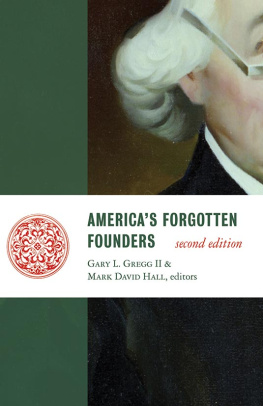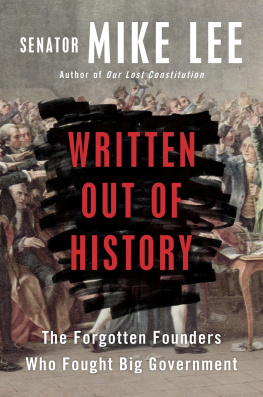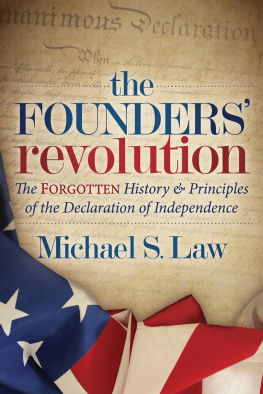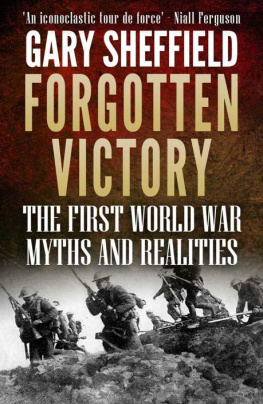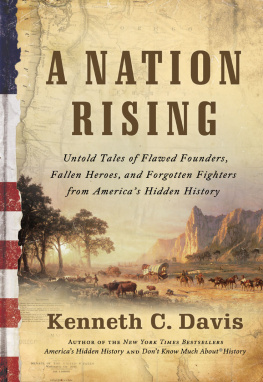A NOTE FROM THE PUBLISHER
ISI BOOKS INAUGURATED THE LIVES OF THE FOUNDERS SERIES IN 2008 to study important figures of the American Founding who have been unjustly forgotten. While the United States is certainly indebted to the work and thought of such legendary Founders as Washington, Jefferson, Adams, Madison, Franklin, and Hamilton, the truth is that hundreds of men and women made considerable contributions to the Founding.
Moreover, America's course was by no means preordained. When and whether to declare independence from Britain, how to prosecute the Revolutionary War, the precise structure of the new American governmentthese and many other issues were the subject of serious, and often fierce, debate. By studying lesser-known but influential figures, we get a fuller sense of the contending ideas, controversies, struggles, and particular circumstances that shaped the trajectory of American history.
ISI's Lives of the Founders series reintroduces many of these important thinkers, with works on Luther Martin, the Anti-Federalist polemicist; Gouverneur Morris, who wrote large parts of the Constitution; Nathanael Greene, who after Washington was the most important American general of the War for Independence; Charles Carroll of Carrollton, the only Catholic to sign the Declaration of Independence; and Oliver Ellsworth, a vital force in shaping the Constitution as a Federalist document.
And now ISI is excited to present America's Forgotten Founders. Based on the first-ever scholarly ranking of neglected Founders, this book introduces the reader to many of the great minds of the Founding generation. This informative study not only shines a light on our underappreciated Founders; it also gets to the bottom of why they remain in obscurity.
By examining the lives and thought of forgotten Founders, we can more fully understand the underpinnings of our great nation. They open up a whole new world of debates and philosophies that informed the birth of America but have been lost to history.
America's Forgotten Founders opens the door to a full scholarly treatment of our neglected Founders. It brings forth a new depth and richness to the Founding generation, serving as the perfect introduction to the more in-depth studies in ISI's Lives of the Founders series. This essential book also allows us to understand the debates that animated the Founders, why certain sides won, and how the results of those debates have shaped our country ever since.
INTRODUCTION
GARY L. GREGG II and MARK DAVID HALL
WHEN AMERICANS THINK OF THE FOUNDING FATHERS, ONLY A handful of leaders generally come to mind. Although the list may vary slightly from person to person, names like Benjamin Franklin, George Washington, John Adams, Thomas Jefferson, James Madison, and Alexander Hamilton inevitably surface. In some respects this is not surprising given that by any measure these statesmen are among the most important and influential men in American history. A narrow focus on these great men, however, does not tell the full story of the American Founding experience and can be misleading in several ways:
(1) It is tempting to generalize from these six men to all of the Founders, but it is not self-evident that their views represent those held by all Founders. Indeed, our own research indicates that at least in some cases they do not.
(2) As with most history, the list is biased toward winners. Some men and women on the losing side of important debates and actionssuch as the declaration of American independence and the ratification of the U.S. Constitutionmade significant contributions to America's Founding.
(3) The list may be biased in terms of race and gender. Even acknowledging the cultural facts of the period, there is no denying that there were women and racial minorities who played significant, if largely unrecognized, roles in the overall events that comprise the American Founding.
(4) The list favors men who served prominently in the executive branch of government. It is noteworthy that four of the six most readily recognizable Founders served as president of the United States of America.
Daniel L. Dreisbach, in this volume's lead essay, addresses the question of why some Founders are remembered and others are not. He argues that, in general, the famous Founders were recognized as great in their own day, came from power centers in the new nation, supported the Declaration of Independence and/or the new Constitution, left a voluminous paper trail, and (with the exception of Franklin) played prominent roles in the new national government. He does not suggest that the famous Founders were not great men, but he does contend that there is a much larger company of statesmen who made salient contributions in thought, word, and deed to the construction of America's republican institutions. We agree.
In order to promote study of a wider range of Founders, we asked more than one hundred history, political science, and law professors who have written on the Founding era to respond to the following question:
Who are the Founders that have been neglected in American history texts and in public knowledge but who played significant enough roles to be remembered or whose example and thought should be remembered in America today?
For the purpose of the survey, we defined Founders as the broad group of men and women who helped secure America's independence from Great Britain and/or helped establish the new constitutional republic and its political institutions. These individuals may or may not have held political office, and in some instances they may have even been on the losing side of history with respect to some issues.
Our respondents listed seventy-three men and women who they believed have been unjustly neglected by history. The complete list is found in at the back of this volume.
We were surprised and encouraged by the wide range of names suggested by our respondents. Their responses raise a number of questions, but none more intriguing than Who should count as a Founder? For instance, should Founders include men and women such as:
Nancy Ward/Nanye-hi (c. 17381822), a female Cherokee leader who advocated peaceful coexistence with whites.
George Whitefield (17141770), the English minister whose preaching tours of America helped spark the First Great Awakening (1730s1740s).
Phillis Wheatley (17531784), the African American poet who was born into slavery.
John Marshall (17551835), the great chief justice whose primary contributions to the creation of the American Republic were made after 1800.
Ezra Stiles (17271795), the Congregationalist clergyman and president of Yale College who never held a political office.
The diversity reflected in the list of Founders produced by our survey points to the difficulty scholars have in untangling the extremely complex web of events and personalities that make up any human endeavor, particularly one from a distant past. Who can really account for the importance of the whispered word of advice on some late night after the children have gone off to bed or the chance meeting of men in an inn the night before a key decision would be made? Who can truly understand the ultimate impact of any one man or woman and how history might have been different if they had not lived or engaged in the world of affairs? We appreciate the efforts of our survey participants to untangle some of history's webs.

